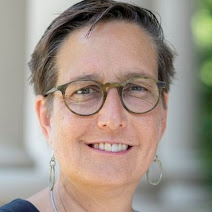Last week, I
wrote that in order to lower your environmental impact, one thing you can do is eat less meat.
If you're thinking that's a good idea, but you're not sure how or whether it's healthy, I'm going to try to answer some potential questions.
How will I get enough protein?
Research about how much protein we need is on-going.
Many nutritionists think that most Americans get more protein than they need. But
some scientists think more protein is better, as long as it's not meat protein.
The most recent government nutrition guidelines switched from a pyramid to a
plate. Half the plate contains fruit and vegetables, the other half whole grains and protein foods. If you're trying to limit meat, veggie burgers and tofu pups are one option, but it's good to mix them up with less processed foods. In any case, it's easy to get plenty of protein from beans, legumes, and nuts.
Back in the 1970s, people believed that vegans had to combine grains and legumes in carefully complementary proportions at every meal to get "complete" proteins. That idea still floats around, though
it's been debunked; what vegans need is to eat a variety of different foods across several days to a week. But that's a good idea for everyone.
If you're cutting back on meat, you should think about what you're replacing those calories with. Switching from bacon and eggs to poptarts for breakfast? Probably not a great idea. A bowl of cereal with dried fruit, nuts, and seeds or a couple of pieces of toast with nut butter and sliced bananas would be healthier options.
I feel best on a diet of beans and legumes with lots of greens, and a little bit of whole grains and fruit. But everyone is different. If you cut back on meat without adding other sources of protein, you might find that you get hungry more often; in that case, you might need to make more of an effort to include plant-based proteins in your diet.
The important thing is to find some options that you like. Google "vegan recipes" and make a commitment to yourself to try out one new recipe a month. Or one a week, if you're feeling energetic about it.
Is it healthy?
It's well established that plant-based diets are healthier than diets heavy in meat, and reduce risk for
heart attack and stroke,
type 2 diabetes, inflammatory disease, and some
cancers.
If you cut back on meat and dairy products, but don't cut them out entirely, and replace them with vegetable proteins and whole grains and vegetables, you don't have to worry about anything else.
If you completely cut out animal products, you need to pay attention to your intake of
vitamin B12, because deficiency can lead to anemia or nerve damage. Nutritional yeast is one of the only plant sources. Soy milk and cereal and a lot of other foods are fortified with vitamin B12, so if you're eating plenty of those, you could be fine, but pay attention and consider a supplement.
You might also worry about
getting enough calcium. Dairy industry advertising implies that you have to drink milk, but there are plant sources as well. Eating meat seems to increase our need for calcium, so vegans might not need as much. It's in fortified soy products, collard greens, kale, tofu that's been coagulated with calcium sulfate (check the label), and various other greens and legumes. Or you can cover your bets by taking a supplement.
Iron is another potential concern. Cook in a
cast iron pan and you'll be fine.
Will it cost me money?
If you buy a lot of faux meat products, maybe. Non-dairy milk substitutes are often more expensive than regular milk, unless you're buying organic milk. Food prices vary widely depending on seasonal availability and where you live.
But right now, the cheapest ground beef from Fresh Direct (which delivers groceries in New York City) is $3.99 a pound. A pound of pinto beans at $2.39 is good for 12 servings; a 15.5 ounce can of cooked pinto beans (3.5 servings) is 99 cents. You can do the math.
How can you tell if someone is vegan?
They'll tell you.





